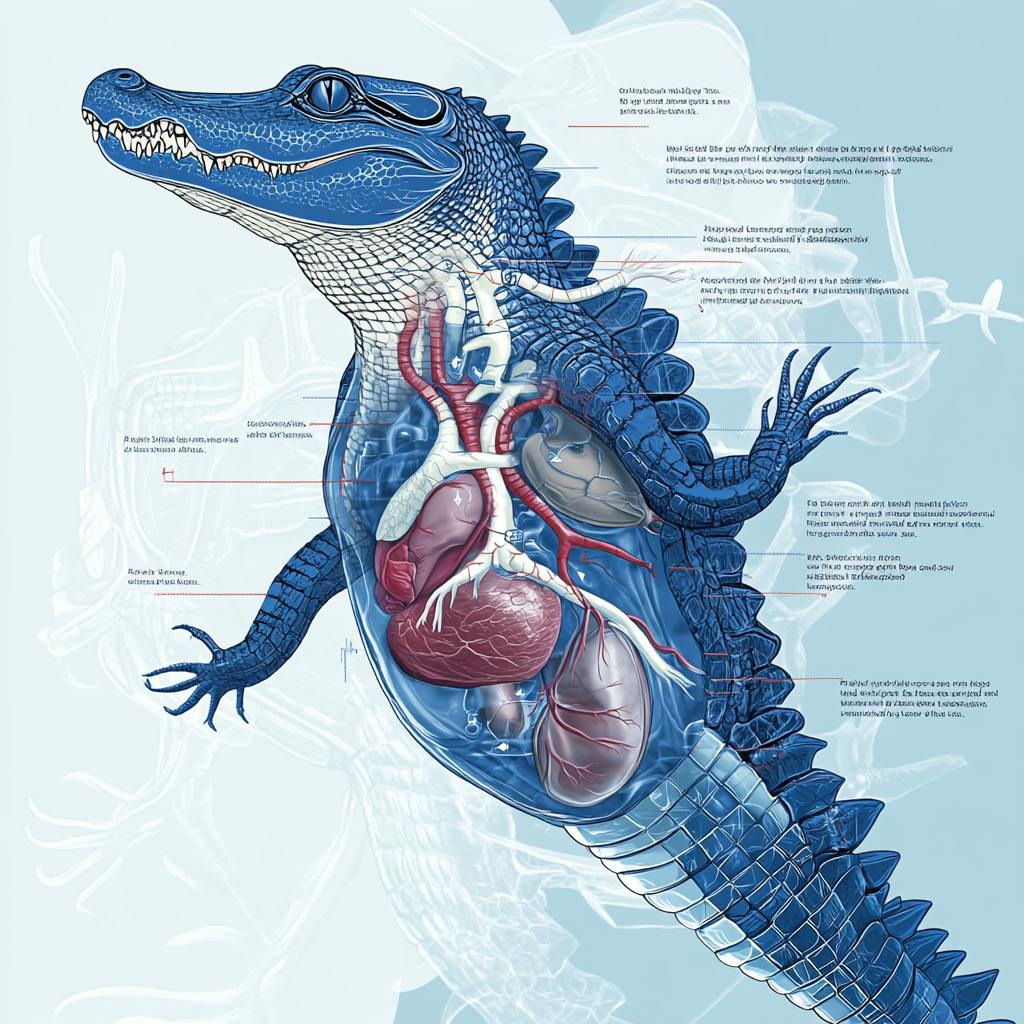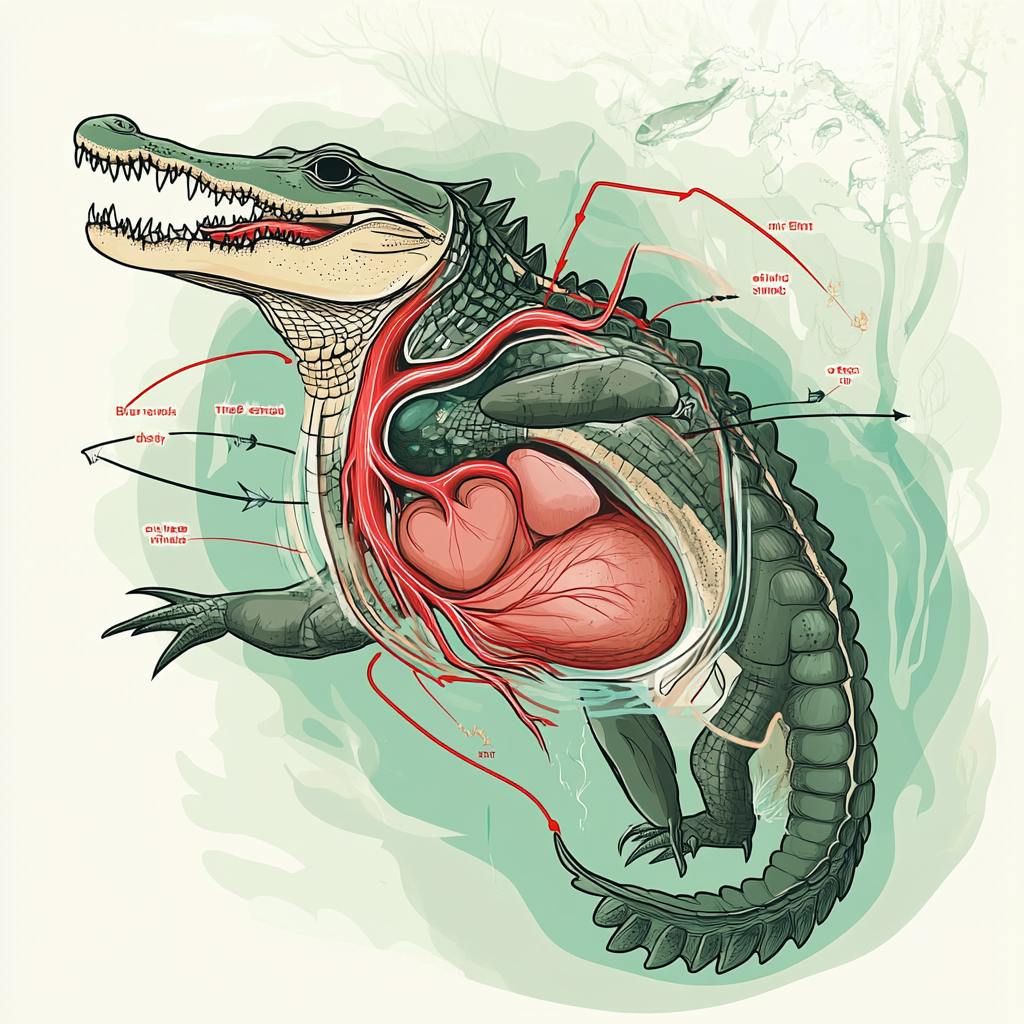Introduction
Alligators are among the most fascinating reptiles on the planet, known for their ancient lineage and remarkable adaptations that have allowed them to thrive for millions of years. One of the most intriguing abilities of alligators is their capacity to hold their breath underwater for extended periods. This unique trait is not only crucial for their survival but also raises many questions: How long can alligators stay underwater? What enables them to hold their breath for so long? And do larger alligators have an advantage in this regard? In this article, we’ll dive deep into the world of alligator physiology to explore these questions and more.
Understanding Alligator Physiology
Alligators, like other reptiles, have a respiratory system that is highly adapted to their semi-aquatic lifestyle. Their ability to hold their breath underwater is largely due to how their body conserves oxygen and slows down their metabolism when submerged. This allows them to remain underwater for extended periods without needing to surface for air frequently.
When an alligator dives underwater, several physiological changes occur. First, their heart rate slows down dramatically, which reduces the oxygen demand of their body. This process, known as bradycardia, is a key factor in their breath-holding capability. Additionally, alligators can shunt blood away from their lungs and towards vital organs, further conserving oxygen. These adaptations enable them to remain submerged for far longer than most other animals.
How Long Can an Alligator Stay Underwater?
On average, an alligator can hold its breath underwater for about 20 to 30 minutes. This duration is typically enough for them to hunt, evade predators, or simply rest. However, under certain conditions, alligators can extend this time significantly. For instance, when at rest and in a calm state, alligators have been known to stay underwater for up to two hours. This extended breath-holding ability is particularly useful in cold weather, where they slow their metabolism even further, allowing them to survive for long periods under the ice.
The ability to stay underwater for such extended periods provides alligators with a significant survival advantage. It allows them to ambush prey effectively, as they can lie in wait just beneath the surface, almost invisible to unsuspecting animals that approach the water’s edge. It also helps them avoid potential threats by staying submerged until the danger has passed.

How Long Can Larger Alligators Hold Their Breath?
Interestingly, the size of an alligator plays a role in how long it can hold its breath. Larger alligators generally have a greater capacity to hold their breath compared to smaller ones. This is because larger alligators have more muscle mass, which allows them to store more oxygen in their tissues. Additionally, their larger body size means they can slow their metabolism more effectively, further extending their time underwater.
This advantage is particularly noticeable in adult alligators, which can grow to be over 12 feet long. These larger alligators have been observed staying underwater for more than two hours under the right conditions, particularly in cooler environments where their metabolism is naturally slower. This capability not only aids them in hunting but also in maintaining their position as apex predators in their habitats.
The Importance of Breath-Holding for Alligators
The ability to hold their breath underwater is not just a remarkable physiological feat; it is also a critical survival mechanism for alligators. In their natural habitats, which range from swamps and marshes to rivers and lakes, being able to stay submerged for long periods allows alligators to perform several essential activities without being detected.
For example, when hunting, alligators rely on stealth to capture their prey. By staying underwater, they can approach their target quietly, often getting within striking distance before the prey even realizes the alligator is there. This method of ambush hunting is highly effective and relies heavily on the alligator’s ability to hold its breath for extended periods.
Additionally, breath-holding is crucial during the colder months when alligators enter a state known as brumation, a hibernation-like condition where their metabolic rate drops significantly. During this time, alligators may spend days or even weeks underwater, with only their nostrils exposed to breathe when necessary. This ability to stay underwater while brumating helps them survive in environments where the water may freeze over, trapping them beneath the ice.
Factors Influencing How Long Alligators Hold Their Breath
Several factors influence how long an alligator can hold its breath. Environmental conditions, such as water temperature and oxygen levels, play a significant role. In cooler water, alligators can hold their breath longer due to their reduced metabolic rate. Conversely, in warmer water, where their metabolism is higher, they may need to surface more frequently.
Age and health also affect an alligator’s breath-holding capacity. Younger alligators, which are smaller and have less developed respiratory systems, generally cannot stay underwater as long as their larger, older counterparts. Similarly, an alligator in poor health may not be able to hold its breath as effectively, especially if it is dealing with respiratory issues or other illnesses.

Myths and Facts About Alligators Holding Their Breath
There are many myths surrounding how long alligators can hold their breath, with some people believing they can stay underwater indefinitely. While alligators are incredibly adept at holding their breath, they do eventually need to surface for air. However, their ability to slow their metabolism and conserve oxygen makes them one of the most proficient breath-holders in the animal kingdom.
FAQ's
Introduction
Many people are curious about whether alligators, alligator gar, and other similar species can be found in Virginia and West Virginia. This article provides detailed answers to these common questions, offering a comprehensive understanding of the presence of these reptiles in various parts of these states.
1. Are There Alligators in Virginia?
Yes, there are alligators in Virginia, but they are rare and primarily found in the southeastern part of the state. The most northerly extent of their range is the Dismal Swamp, which borders North Carolina. Alligators in Virginia are not commonly encountered and are not a significant presence compared to states like Florida or Louisiana.
2. Are There Alligators in West Virginia?
No, alligators are not native to West Virginia. The colder climate of West Virginia is not suitable for alligators, which thrive in warmer, southern states. There have been no verified sightings of wild alligators in West Virginia.
3. Are There Alligators in Virginia Beach?
No, there are no alligators naturally found in Virginia Beach. While Virginia Beach is close to the southeastern regions where alligators might occasionally be found, the urban and coastal environment of Virginia Beach is not suitable for alligators.
4. Are There Alligator Gar in West Virginia?
Alligator gar are not typically found in West Virginia. They are more common in the Mississippi River basin and Gulf Coast states. West Virginia’s colder and mountainous environment is not ideal for this species.
5. Are There Alligators in Lake Anna, Virginia?
There are no alligators in Lake Anna, Virginia. This man-made lake is popular for recreation, but its environment and cooler waters are not conducive to alligators, which prefer warmer habitats.
6. Are There Any Alligators in Virginia?
Yes, as mentioned earlier, there are a small number of alligators in the southeastern regions of Virginia, particularly near the Dismal Swamp. However, they are not widespread and are rarely seen.
7. Are There Alligator Gar in Virginia?
Alligator gar are not native to Virginia. This species is more common in the southern United States, particularly in the Gulf Coast region. Virginia's waters are not typically suitable for alligator gar.
8. Are There Alligators in Norfolk, Virginia?
No, alligators are not found in Norfolk, Virginia. While Norfolk is in southeastern Virginia, close to areas where alligators might rarely appear, there have been no significant reports of alligators in this urban area.
9. Are There Alligators in Northern Virginia?
No, there are no alligators in Northern Virginia. The climate in Northern Virginia is too cold for alligators, which prefer warmer, subtropical environments found further south.
10. Are There Alligators in Smith Lake, Virginia?
There are no alligators in Smith Lake, Virginia. Smith Lake is a freshwater lake in a region that is not suitable for alligators due to the cooler climate and lack of suitable habitat.
11. Are There Alligators in Virginia in 2017?
In 2017, as in other years, alligators were present in Virginia only in the southeastern regions, such as the Dismal Swamp area. They have not been widespread or commonly seen across the state.
12. Are There Alligators in Virginia in 2018?
In 2018, the situation was the same as in previous years, with alligators found only in the far southeastern part of Virginia. There were no significant changes in their distribution or population in the state.
13. Are There Alligators in Virginia Lakes?
Generally, there are no alligators in Virginia's lakes. Most of Virginia’s lakes are located in regions that are too cold for alligators. Only in the far southeastern parts of the state, near the Dismal Swamp, might alligators be found, but they are not common in lakes.
14. Are There Alligators in Virginia Map?
Maps showing the distribution of alligators in the United States typically do not include Virginia, except for the southeastern corner near the Dismal Swamp. This area is the northernmost extent of the alligator's natural range.
15. Are There Alligators or Crocodiles in Virginia?
There are alligators in the southeastern part of Virginia, but there are no crocodiles. Crocodiles are typically found in much warmer climates, such as southern Florida. Virginia’s climate is not suitable for crocodiles.
16. Are There Alligator Snapping Turtles in Virginia?
Yes, alligator snapping turtles are present in Virginia, particularly in the southeastern parts of the state. These large freshwater turtles are found in rivers and lakes, and while they are not as common as in some southern states, they are native to Virginia.
Conclusion
Alligators are remarkable creatures with a host of adaptations that make them successful predators and survivors in their environments. Their ability to hold their breath underwater for extended periods is one of their most impressive traits, allowing them to hunt effectively, avoid predators, and survive in challenging conditions. Whether it’s a smaller juvenile or a larger adult, the alligator’s breath-holding capability is a testament to the incredible design of these ancient reptiles. Understanding this aspect of alligator physiology not only deepens our appreciation for these animals but also underscores the importance of preserving their habitats so that they can continue to thrive.





